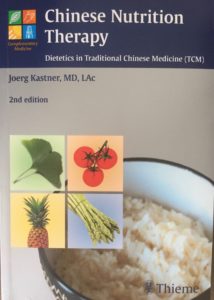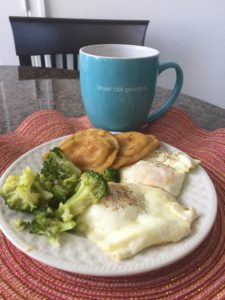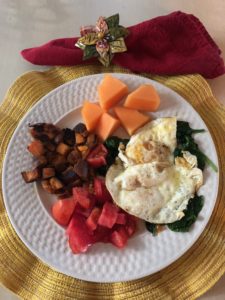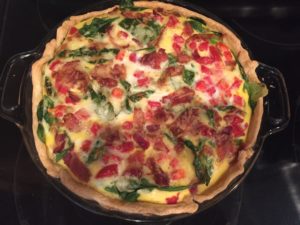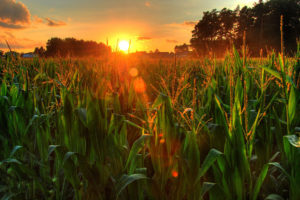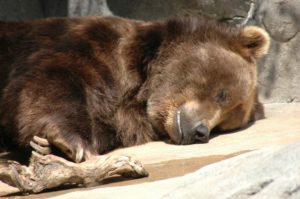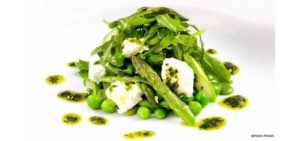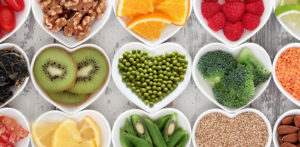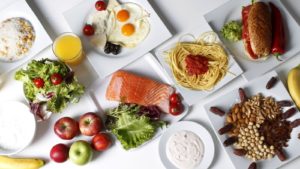Chinese Nutrition tips will help you find ways to feel healthier and stronger, which leads to a happier you! What we eat, how we eat and when we eat all affect our bodies. All food has something called ‘thermal energy’ and so what we eat affects the temperature of our bodies as well as how it functions. For instance, during the winter our bodies crave warm, cooked foods. So if we eat a lot of raw, uncooked vegetables (like salads) drink cold drinks (with ice–NO), have smoothies for breakfast, our Spleens will rebel. And most likely we will experience indigestion, cramping and pain in our bellies. Instead, if we choose to eat warm foods, such as oatmeal or eggs and cooked veggies for breakfast, our bodies will feel much better. Choosing soup over salads for lunch is another great example. Experiment for a week to see for yourself!
Here are two of my personal favorite breakfast meals:
- fried eggs, with pierogies, cooked broccoli, with a cup of hot tea.
- two fried eggs, over sauteed spinach with tumeric, fresh garlic and tomatoes from the garden, and my famous roasted Sweet Potatoes! Recipe here!
Summer is the most Yang time of the year. Everything is coming to full maturation. Look at the flowers in bloom. The vegetables are ripening. The baby 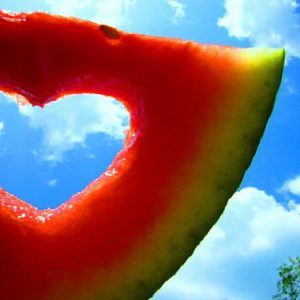 birds and geese are getting bigger and learning how to fly. This is the best time of year to enjoy laughter and experience joy! Summer is equated with the Fire energy. Think about what a fire does when you feed it wood. It gets bigger and grows stronger! Sparks fly and flames shoot upward and outward. The same is true with conversation and partnership. When you feed it, it grows and spreads. Summer is a great time to meet new friends, host outdoor BBQ’s, learn to fish or kayak, take walks with a friend. Obviously it is hot and sunny during summer. Staying hydrated is vital. Be sure to drink half of your body weight (in ounces) of water daily! Enjoy cooling foods like watermelon on the hot days! This naturally cools your body off. Be careful of the heat as it can wreak havoc in your body if you get too much of it!
birds and geese are getting bigger and learning how to fly. This is the best time of year to enjoy laughter and experience joy! Summer is equated with the Fire energy. Think about what a fire does when you feed it wood. It gets bigger and grows stronger! Sparks fly and flames shoot upward and outward. The same is true with conversation and partnership. When you feed it, it grows and spreads. Summer is a great time to meet new friends, host outdoor BBQ’s, learn to fish or kayak, take walks with a friend. Obviously it is hot and sunny during summer. Staying hydrated is vital. Be sure to drink half of your body weight (in ounces) of water daily! Enjoy cooling foods like watermelon on the hot days! This naturally cools your body off. Be careful of the heat as it can wreak havoc in your body if you get too much of it!
Late Summer is a time for harvesting what has been growing and maturing all summer. Not only is this for vegetables and fruits, but it is also for what is going on in our minds and hearts. It is also a time for slowing down a bit in order to enjoy all the hard work one has put into life. Late summer resonates with a heaviness in the air, time to linger in a rocking chair on the porch or a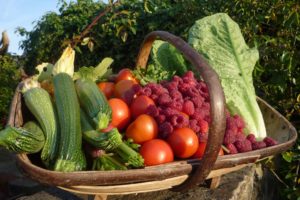 hammock on a hot afternoon. It is also a time to harvest ideas and consider what you want to do with them. Enjoy what is ripe around you, especially the ripe vegetables at the farmer’s stands and the fresh fruits that have grown in your area. Roasting or grilling homegrown veggies is so yummy! Go ahead and make a peach pie and enjoy it. Now is the time to eat what is now ripe for the picking! Remember to stay hydrated with water especially in the heat! Half of your body weight is what you need on a daily basis. Water is the key to life. It lubricates the sinews and tendons, easing pain. It helps you stay focused and your body systems working the way they should be.
hammock on a hot afternoon. It is also a time to harvest ideas and consider what you want to do with them. Enjoy what is ripe around you, especially the ripe vegetables at the farmer’s stands and the fresh fruits that have grown in your area. Roasting or grilling homegrown veggies is so yummy! Go ahead and make a peach pie and enjoy it. Now is the time to eat what is now ripe for the picking! Remember to stay hydrated with water especially in the heat! Half of your body weight is what you need on a daily basis. Water is the key to life. It lubricates the sinews and tendons, easing pain. It helps you stay focused and your body systems working the way they should be.
Fall or Autumn is my favorite time of year. I love the crisp, cooler days, especially when the sun is shining, the skies are blue. Taking in slow deep breaths on these days feels so good to my body. The days are beginning to shorten. There is less sunlight, which can be a bummer. However, there is a welcoming feeling of winding down. Fall is for letting go of things that you do not need anymore. It is a time for pruning and getting rid of stuff, body, mind and spirit. So if you are hanging onto a grudge, let it go. Our bodies crave warm foods as we head into fall. Trade that salad for a nice, warm soup instead. Sip on a cup of hot herbal tea. Drink your water room temperature instead of with ice. Remember to grab a scarf on the breezy days. Protecting your neck is important as the days get cooler.
Winter is the most “yin” time of the year. It is meant to be for down time, rest, refueling our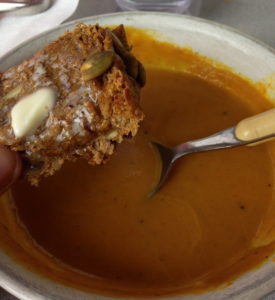 bodies. It is the time of year for taking what we have harvested in the fall, and storing up our energy for the following Spring. If we follow nature, and use the bears as an example, we should be hibernating under blankets, staying inside, experiencing the quiet of winter in our body, mind and spirit. Soup is the ideal food for us during the winter. Go here to see Rosie’s Winter Recipes. Your body will thank you! How else could you find more Yin time?
bodies. It is the time of year for taking what we have harvested in the fall, and storing up our energy for the following Spring. If we follow nature, and use the bears as an example, we should be hibernating under blankets, staying inside, experiencing the quiet of winter in our body, mind and spirit. Soup is the ideal food for us during the winter. Go here to see Rosie’s Winter Recipes. Your body will thank you! How else could you find more Yin time?
Spring is all about birth, growth, and rising energy. You can feel it as the days start to get longer and you hear the birds outside your window. All you have to do it look outside and you will see, feel and experience Spring. The daffodils, crocuses and tulips are pushing their way UP through the ground, even through the spring snow! They are determined to get up and out and feel that sunshine. Birds have returned from the south, are building their nests and eggs are being laid. Soon the baby birds will be born! The grass is starting to turn greener every day and there are buds on all the trees. I LOVE this time of year. Your body can start to handle some sprouts and spring greens this time of year as long as you remember to eat something warm with them. Make sure you are getting adequate rest and wearing scarves until the Spring ‘robber winds’ have died down. Our spleen and stomachs still want warm things, so continue the soups and warm breakfasts. Add some cinnamon to oatmeal or congee if you have allergies or feel a cold coming on.
and you hear the birds outside your window. All you have to do it look outside and you will see, feel and experience Spring. The daffodils, crocuses and tulips are pushing their way UP through the ground, even through the spring snow! They are determined to get up and out and feel that sunshine. Birds have returned from the south, are building their nests and eggs are being laid. Soon the baby birds will be born! The grass is starting to turn greener every day and there are buds on all the trees. I LOVE this time of year. Your body can start to handle some sprouts and spring greens this time of year as long as you remember to eat something warm with them. Make sure you are getting adequate rest and wearing scarves until the Spring ‘robber winds’ have died down. Our spleen and stomachs still want warm things, so continue the soups and warm breakfasts. Add some cinnamon to oatmeal or congee if you have allergies or feel a cold coming on.
Chinese Nutrition tips…
Nutrition has played an important role in China’s traditional medical system for many centuries and continues to do so. Chinese physicians have always regarded food as medicine. Eating a balanced diet was how the body was kept in harmony. Changing weather conditions throughout the year were taken into account by adjusting the diet accordingly and choosing the appropriate ingredients.
Chinese Nutrition tips can benefit everyone:
Today, nutrition is still firmly rooted in public awareness in China and is regarded as an essential element in achieving a long and fulfilled life. The Chinese diet is a preventative diet. External climate factors determine daily food choices. In times of extreme cold for instance, dishes using acrid (spicy, pungent) spices provide increased nourishment for the body. An example of this is warm chili. Go here for Rosie’s (free) favorite chili recipe.
In winter, the emphasis is on warming and hot dishes, while in times of extreme external heat (like the dead of summer), the body is calmed with cooling dishes. It is possible to practice this type of a preventative diet in other parts of the world. Furthermore, it can be followed by most people. It requires no special expertise other than a general understanding of Chinese nutritional principles. Healing diets that address imbalance, however, require a clear diagnosis and development of a therapy strategy by a professional acupuncturist. To find one in your area, go here.
Diet influences all functions and processes in the body. Some general nutritional recommendations are below.
Chinese Nutrition tips–
Please take the following to heart:
- Use high quality, clean, and unprocessed foods, organically grown whenever possible. This excludes artificial ingredients and genetically modified products.
- Create a pleasant, relaxed atmosphere in which you can enjoy your meals.
- Eat with pleasure (not while having an argument or cramming for an exam)
- Eat regularly, between 3 to 5 times a day.
- Do not rush your meals and chew each bite well (between 10-15 times)!
- Eat breakfast like a King, lunch like a Prince, and dinner like a Pauper (or starving college kid).
- Stop eating when it tastes best!
- Drink only small amounts of liquids during meals; too much liquid with meals or right before or after a meal can weaken your digestive fire.
- When putting together a meal, take into account your individual constitution (more on that later).
- Choose foods that are appropriate for the season (choosing locally grown foods that are in season is often a good way). In other words, if you live in the north, and its snowing outside, do not buy and eat blackberries from Costa Rica in January! Your body is not meant to eat those foods during that time of the year!
- When following a vegetarian diet, ensure that your diet contains enough energetically warming foods [like Congee]; increase the use of acrid spices in cold weather.
More Chinese Nutrition tips–
Please AVOID the following:
- Too much raw or cold food and tropical fruits: These are energetically too cool, reduce the energy of the center burner, and if consumed, regularly, can cool the kidney organ network.
- Ice-cold beverages: They block stomach and spleen/pancreas qi flow and weaken spleen qi and spleen yang.
- Too much dairy: Dairy products are energetically too cool. They weaken the spleen/pancreas network and cause dampness and phlegm to form.
- Exhausting discussions (arguments) or other distractions during a meal (TV, radio, reading); They can block the flow of qi in the center burner and cause food stagnation.
- Large amounts of oily, fatty food: Blocks the flow of qi and causes heat, dampness, and phlegm.
- Too much alcohol: Causes damp heat, promotes formation of phlegm and hurts jing, along with a number of other unpleasant effects.
- An overabundance of meat: Causes dampness and phlegm to form.
- Late evening meals: Blocks the flow of qi, causes food obstruction,weakens the spleen/pancreas network, and leads to weight gain.
- Overly opulent meals: Blocks flow of qi, causes food stagnation, burdens the spleen/pancreas network, causes dampness and phlegm and leads to weight gain.
- Excessive and prolonged fasting: weakens the center burner, as well as yin, blood (Xue) and jing.
Chinese Nutrition tips–Something to keep in mind
Chinese nutrition therapy first requires a diagnosis based on the principles of TCM (Traditional Chinese Medicine). The appropriate choice of foods provides a foundation for further treatment methods such as acupuncture and herbal therapy. Dietary therapy adjusted to the individual’s symptoms creates a good basis for additional treatments, resulting in quicker and more effective improvement. Chinese practitioners find it hard to understand why most doctors in the Western world utilize only one treatment at a time, for example, acupuncture, instead of making full use of all treatments available and coming up with a comprehensive treatment strategy. In traditional Chinese hospitals, a patient’s individual diet plan is part of a holistic treatment concept.
Example:
The treatment of insomnia, which aims to drain Yang, will not prove successful through acupuncture alone if patients continue to stimulate their Yang by consuming warm or hot foods. Examples are coffee, hot spices, alcohol, garlic, onions, and lamb. By ignoring dietary recommendations, the patient essentially works against the acupuncture treatment rather than with it. Abstaining from foods containing Yang and giving preference to Yin foods, on the other hand, supports the acupuncture treatment and promotes success.
To learn more about Blood Deficiency, which is one of the causes of insomnia, go here.
Go here to learn more about if Acupuncture is for you?
If you’d like to see the book where I got some of the information for Chinese Nutrition tips here, you can find it here.
